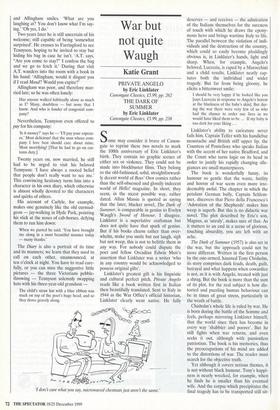War but not quite Waugh
Katie Grant PRIVATE ANGELO by Eric Linklater Canongate Classics, £5.99, pp. 262 THE DARK OF SUMMER by Eric Linklater Canongate Classics, £5.99, pp. 238 Some may consider it brave of Canon- gate to reprint these two novels to mark the 100th anniversary of Eric Linldater's birth. They contain no graphic scenes of either sex or violence. They could not be made into blockbuster films. They belong to the old-fashioned, solid, straightforward- ly decent world of Boys' Own comics rather than the self-obsessed and glossily indecent world of Hello! magazine. In short, they seem, in the nicest possible way, rather dated. Allan Massie is quoted as saying that the later, blacker novel, The Dark of Summer, is comparable in genius to Evelyn Waugh's Sword of Honour. I disagree. Linklater is a superlative craftsman but does not quite have that spark of genius. But if his books charm rather than over- whelm, make you smile but not laugh, sigh but not weep, this is not to belittle them in any way. For nobody could dispute the poet and fellow Orcadian Edwin Muir's assertion that Linklater was a writer 'who in any country would be acknowledged to possess original gifts'.
Linklater's greatest gift is his linguistic and cultural perfect pitch. Private Angelo reads like a book written first in Italian then beautifully translated. Sent to Italy in 1944 as the War Office's official historian, Linklater clearly went native. He fully
'I don't care what you say, micro waved chestnuts just aren't the same.' deserves — and receives — the admiration of the Italians themselves for the sureness of touch with which he draws the epony- mous hero and brings wartime Italy to life. The parallel between the violation of indi- viduals and the destruction of the country, which could so easily become ploddingly obvious is, in Linklater's hands, light and sharp. When, for example, Angelo's beloved, Lucrezia, is raped by a Marocchini and a child results, Linklater neatly cap- tures both the individual and wider tragedy. But far from being gloomy, he elicits a bittersweet smile:
I should be very happy if he looked like you [says Lucrezia in response to Angelo's horror at the blackness of the baby's skin]. But dur- ing the war there were very few of us who had the chance to order our lives as we would have liked them to be ... If my baby is too dark for your liking ...
Linklater's ability to caricature never fails him. Captain Teller with his handlebar moustache and British stiff upper lip, the Countess of Pontefiore who speaks Italian with the accent of her native Bradford, and the Count who turns logic on its head in order to justify his rapidly changing alle- giances are small masterpieces.
The book is wonderfully funny, its humour so gentle that the waste, futility and horror of war seem even more irre- deemably awful. The chapter in which the petulant German bully, Captain Schlem- mer, discovers that Piero dells Francesca's 'Adoration of the Shepherds' makes him weep is superb. But this is no didactic war novel. The plot described by Eric's son, Magnus, as 'unruly', makes sure of that. As it stutters to an end in a scene of glorious, touching absurdity, you are left with an ache.
The Dark of Summer (1957) is also set in the war, but the approach could not be more different. Written in the first person by the one-armed, haunted Tony Chisholm, its story comprises dark feuds, death, guilt, betrayal and what happens when cowardice is not, as it is with Angelo, treated with just a shrug. But the book is more than the sum of its plot, for the real subject is how dis- torted and puzzling human behaviour can be in times of great stress, particularly in the wrath of battle.
Chisholm's whole life is ruled by war. He is born during the battle of the Somme and feels, perhaps mirroring Linklater himself, that the world since then has become in every way 'shabbier and poorer'. But he still fights when war returns, and even seeks it out, although with passionless patriotism. The book is his memories, thus the preoccupations of his mind are added to the distortions of war. The reader must search for the objective truth.
Yet although it covers serious themes, it is not without black humour. Tony's happi- ness is nearly wrecked, for example, when he finds he is smaller than his eventual wife. And the corpse which precipitates the final tragedy has to be transported still sit- ting on its chair. Best of all, and the one Oteoccupation of the Scottish sergeant is that Chisholm, in his report, should spell his name with a double 's'. Fergusons with a single `s"aren't always clean potatoes'. 'I know my fellow Scots,' Chisholm tells the reader. 'They are capable of being superbly obsessed by ideas that the rest of the world must always regard as trivial.'
These books are not trivial and deserve to be read widely. I congratulate Canon- gate for bringing them to our attention once again.























































































































 Previous page
Previous page